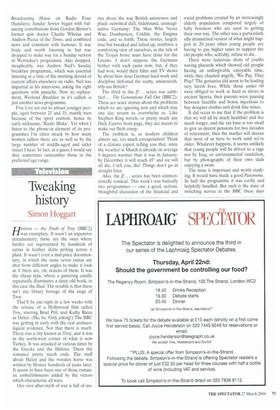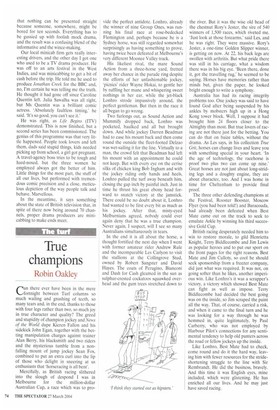Tweaking history
Simon Hoggart
orizon — the Truth of Troy (BBC2) was exemplary. It wasn't an expensive documentary; those are the ones where battles are represented by hundreds of extras in leather skirts pelting across a plain. It wasn't even a mid-price documentary, in which the same seven extras are shot from different angles to make it look as if there are, oh, dozens of them. It was the cheap type, where a guttering candle repeatedly illuminates a dusty old book, in this case the Iliad. The trouble is that there isn't any library footage of the siege of Troy.
That'll be put right in a few weeks with the release of a Hollywood film called Troy, starring Brad Pitt, and Kathy Bates as Helen. (Ha, ha. Only joking!) The BBC was getting in early with the real archaeological evidence. Not that there is much. There was a city known as Troy, and it was in the north-west corner of what is now Turkey. It was attacked at various times by the Greeks and the Hittites. There the romance pretty much ends. The stuff about Helen and the wooden horse was written by Homer hundreds of years later. It seems to have been one of those romantic embellishments added by the victors which characterise all wars.
Our own after-myth of war is full of sto ries about the way British astuteness and pluck outwitted dull, hidebound, unimaginative Germany: The Man Who Never Was, Dambusters, Colditz, the Enigma code, and so forth. These stories, largely true but tweaked and tidied up, reinforce a comforting view of ourselves, as the tale of the Trojan horse must have done for the Greeks. I don't suppose the Germans bother with such yarns now, but, if they had won, would their films and TV shows be about how dour German hard work and discipline defeated the scatty, amateurish, silly-ass British?
The third in the If. . . series was subtitled... The Generations Fall Out (BBC2). These are scare stories about the problems which we are ignoring now and which may one day return to overwhelm us. Like Stephen King novels, or pretty much any Daily Express front page, they are meant to make our flesh creep.
The problem is, as modern children almost say, too much extrapolation! Think of a climate expert telling you that, since the weather in March is already on average 8 degrees warmer than it was in January, by December it will reach 45° and we will all die, I tell you, die! Things don't go in straight lines.
Also, the If . . . series has been unintentionally comical. This week's was basically two programmes — one a good, serious, thoughtful discussion of the financial and
social problems created by an increasingly elderly population composed largely of baby boomers who are used to getting their own way. The other was a particularly silly dramatised version of what might happen in 20 years when young people are having to pay higher taxes to support the old people who, selfishly, refuse to die.
There were ludicrous shots of youths waving placards which showed old people having an unforgivable enjoyable time, while they chanted angrily, 'We Pay, They Play!' The geriatrics did seem to be leading very lavish lives. While those under 60 were obliged to work as hard as slaves in ancient Sparta, their parents were pausing between facelifts and botox injections to buy designer clothes and drink fine wines.
It did occur to me that if the problem is that we will all be much healthier and live much longer, and the tax base is too small to give us decent pensions for two decades of retirement, then the market will decree that most of us have to work until we're older. Whatever happens, it seems unlikely that young people will be driven to a rage not by Iraq, or environmental vandalism, but by photographs of their own dads enjoying a swim.
The issue is important and worth studying. It would have made a good Panorama. In half the programme it was coolly and helpfully handled. But such is the state of twitching nerves in the BBC these days
that nothing can be presented straight because someone, somewhere, might be bored for ten seconds. Everything has to be gussied up with foolish mock drama, and the result was a confusing blend of the informative and the wince-making.
Our local minicab firm gets really interesting drivers, and the other day I got one who used to be a TV drama producer. He was off to an arts festival in the West Indies, and was minicabbing to get a bit of cash before the trip. He told me he used to produce Jonathan Creek for the BBC and, no, I'm certain he was telling me the truth. He thought it had gone off since Caroline Quentin left. Julia Sawalha was all right, but Ms Quentin was a brilliant comic actress. 'Absolutely faultless timing,' he said. 'It's so good, you can't see it.'
He was right, as Life Begins (ITV) demonstrated. This is now finished, but a second series has been commissioned. The genius of this programme was that very little happened. People took lovers and left them, dads said stupid things, kids needed picking up from school, a girl got pregnant. A travel-agency boss tries to be tough and hard-nosed, but the three women he employed always got the better of him. Little things for the most part, the stuff of all our lives, but performed with tremendous comic precision and a close, meticulous depiction of the way people talk and behave. Marvellous.
In the meantime, it says something about the state of British television that, in spite of there now being around 70 channels, proper drama producers are minicabbing to make ends meet.



























































































 Previous page
Previous page